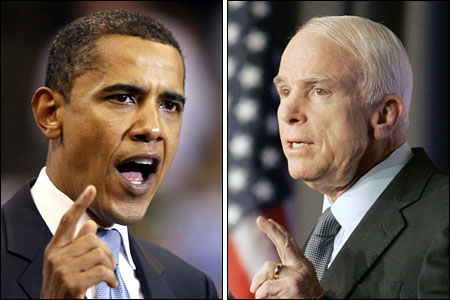John McCain and Barack Obama are expected to talk this evening about foreign policy and national security in the first of three Presidential debates scheduled in the run-up to the election. In a 90-minute segment broadcast to tens of millions of people, the two candidates will each deliver a vision for the future of U.S. foreign policy and its ramifications for the rest of the world. With recent polls suggesting that the race for the White House is extremely close, the debate on foreign policy will prove to be one of the major deciding factors for the American electorate.
Whichever candidate wins will inherit a daunting task. The need to rebuild America’s moral authority in the world comes at a time of uncertainty and change. The question of Iraq will continue to haunt the next administration, as will relations with neighboring Middle Eastern states such as Syria and Iran. The latter’s nuclear program will pose a difficult challenge for any would-be president, especially considering the revised U.S. nuclear policy towards India (who have not signed the NPT) which threatens to undermine diplomacy with Tehran. North Korea will also continue to find ways to defy the IAEA, requiring a greater commitment by the six parties, highlighting divergences between the U.S. and China. Pakistan and Afghanistan will be key issues over the coming months as conditions deteriorate in both countries. The role of Pakistan as an “ally” in the ‘War on Terror’ might be revised in wake of recent clashes between NATO and Pakistani troops along the border with Afghanistan. Finally, a resurgent Russia poses all sorts of dilemmas: how does the recent conflict in Georgia affect NATO expansion; what will happen to key swing states in Europe such as Ukraine, trapped as they are between East and West; and will we see an escalation in tensions with Russia reminiscent of the Cold War?
These are all problems that John McCain and Barack Obama face should they be elected. Below is a run-down on key foreign policy issues and the stance each candidate would assume should they be elected on November 4.
Iraq, Iran and the Middle East
McCain: Supported the war and the surge. Favors keeping U.S. forces in Iraq for the foreseeable future, perhaps until 2013 or until the government is, in his words, “capable of governing itself and safeguarding its people.”
On Iran, McCain rejects unconditional dialogue. He says, “Iran has emerged as the greatest strategic challenge to America in the Middle East in a generation.” McCain claims the Iranian regime is the “foremost threat to Israel.”
Strongly supports Israel and is in favor of a two-state solution.
Obama: Initial opponent of the war and the surge. Believes in a “responsible and phased” withdrawal of 1 – 2 brigades per month, with all but a select assault squad of combat troops home by summer 2010.
On Iran, Obama encourages “diplomacy with no preconditions,” and is willing to talk directly with the regime in Tehran.
Strongly supports Israel – backed Israel’s right to defend itself against rocket attacks from Lebanon in 2006 – and is in favor of a two-state solution.
Russia and NATO Expansion
McCain: Supports Georgian and Ukrainian membership of NATO. McCain speculates that NATO’s decision to withhold a Membership Action Plan for Georgia might have been viewed as a green light by Russia for its attacks on Georgia.
On Russia, McCain has said, “Russian President Medvedev and Prime Minister Putin must understand the severe, long-term negative consequences that their government’s actions will have for Russia’s relationship with the U.S. and Europe.”
Obama: Has called for a “deepening” of relations with Georgia and Ukraine, including a Membership Action Plan (MAP) for NATO. Claims that, “the extension of NATO membership to new democracies in Europe has helped create a zone of peace and prosperity across Europe and enhanced NATO’s military capability by facilitating contributions from new members.”
On Russia, Obama has said “We seek a future of cooperative engagement with the Russian government, and friendship with the Russian people. We want Russia to play its rightful role as a great nation – but with that role comes the responsibility to act as a force for progress in this new century, not regression to the conflicts of the past.”
Afghanistan and Pakistan
Related Commentary on New Atlanticist Blog:
- Sneak Preview of the Future: Who Makes New Rules? – Robert Manning
- Preconditions, Preparations, and Posturing – James Joyner
- Iraq: Time for a Deadline – Neil Leslie
- NATO and the Near Abroad: Beyond Bucharest – Nikolas Gvosdev
- Time to Extend Hand to Ukraine – Alexander Motyl
- Builders, Diplomats, Guardians, and Warriors – Derek Reveron
- Afghanistan: Necessary But Not Sufficient – James Joyner
- NATO’s Afghanistan Strategy Needs Changes Now – Peter Cassata
- Are We Losing in Afghanistan? – Donald M. Snow
- Winning in Afghanistan: Whose Side is Pakistan Really On? – James Joyner
- Pakistan’s Perfect Storm – Shuja Nawaz
Further Reading
You can read more about the candidates’ stated positions on the issues, including some of their speeches, on their websites.
Neil Leslie is an assistant editor at the Atlantic Council.
Image: ObamaMcCain.jpg
